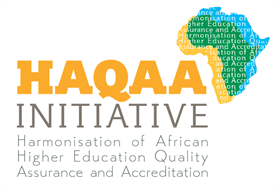Read this in: French
One element of the HAQAA Initiative is to create a common understanding on quality assurance in higher education across the continent, and to explain and clarify the diverse approaches and tools. The HAQAA Implementing Consortium therefore organised a Training Course on ‘Developing a Common Language for Quality Assurance in Higher Education in Africa’ in different phases, targeting representatives from ministries, higher education commissions or accreditation agencies of all African countries. The intention was to ‘level the playing field’ regarding how QA and accreditation are understood in Africa, and ultimately contribute to promoting PAQAF. Led by consortium partner DAAD, the training course drew on both European and African trends and expertise, and had ‘presence’ modules that took place in both regions.
The main expected learning outcomes were as follows:
- The participants have a common understanding of the meaning of quality regarding higher education. They can differentiate between institutional quality assurance ‘culture’ and processes for external quality assurance and accreditation, and understand the important interplay between the two.
- The participants know the QA framework of the European Higher Education Area and are aware of the roles and responsibilities of the different stakeholders within the European system. The interaction between national authorities, higher education institutions, independent QA agencies, students and other stakeholders is studied and analysed.
- Participants can cite good and diverse practices regarding how QA and accreditation can be facilitated at different levels (institutional, national, regional, continental), and how these levels interact towards building a common higher education space.
- Participants know the current QA situation in the five African regions and as well common challenges and demands.
- Participants have identified main challenges for QA in their national/regional QA system and have worked on options for improving their existing QA system.
- Participants have understood the objectives of the African higher education space and more specifically, PAQAF, and have identified ways for disseminating information on these political processes.
Two-phase training course – Methodology
The different phases included mixed methods such as presentations by experts, working in small groups, discussions among the participants, case studies and individual feedback and coaching.
The first phase of the HAQAA Training Course started with a study visit in October 2016 to Belgium and Germany followed by a self-learning and investigation phase. 48 participants were selected via competitive calls for interest. All candidates had the backing of their ministries and were tasked to be disseminators in their own systems. Participants learned about the situation of QA in the higher education systems in Europe and the QA frameworks of the European Higher Education Area. They were split in two groups (English and French speaking groups).
Subsequently, participants defined Personal Action Plans, a specific project relevant to QA reform and improvement in their own countries. Examples included setting up a national QA agency and, in the case of the SADC countries, a collaborative endeavor to develop a credit system for the SADC region.
The second presence phase of the HAQAA Training Course took place in Accra, Ghana in June 2017. This three-day workshop aimed to discuss and improve QA systems in Africa and to raise awareness for news tools and frameworks being developed under PAQAF, like the African Standards and Guidelines for QA (ASG-QA). This phase focused on discussing strengths and weaknesses of different QA systems in Africa and on developing propositions for how to advance PAQAF in a way that respects the diversity if QA and accreditation approaches across the continent
In 2018, a follow-up workshop took place in Cairo, Egypt to unite ‘graduates’ of the Training Course once again and provide them a forum to further discuss the tools and action lines of PAQAF and their roles as ambassadors.


